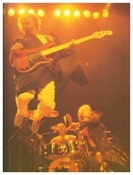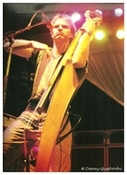
Here come the Police with hits - and misses...
The Police are the Grateful Dead of the new wave, which is to say the Police like nothing more than dispatching with the limitations of short pop and following their collective nose down the long and winding road of experimentation. It's also to say predicting the Police's success/failure ratio for any given set is like turning a blind man loose upon a dartboard... hit, miss, miss, oops-off-the-wall, hit!, hit!, miss...
The scorecard at the Orpheum last night is tipped slightly in the Police's favour. In other words, more of the limbs they crawled out on were solid than were flimsy. While their tangents are not as complex and invigorating as Talking Heads, much of their wandering led to decent grooves and interesting syncopation, if not outright transcendence.
Still, it was all-fans-to-the-restrooms-time when lead singer Sting brought the Police's big early hit, 'Roxanne', down from exultation and let it languish in the mire of the endless call (and response). Hearing 'Roxanne', voiced in every gradation of soft-to-loud does not really ring the song anywhere.
The chief problem when the Police stretch out is they lose their vision of the songs' power. A promising song like 'De Do Do Do, De Da Da Da' (promising musically, not lyrically) crumbles away when the Police lock into a simplistic riff and Sting goes to the front of the stage to prance. On many tracks, the Police shoot for the moon. Unlike Public Image, Ltd. - Johnny Lydon/Rotten's experimental vehicle of chic noise - the Police have the firepower to reach it now and then.
Giving credit where credit is due, even the Police's most wayward noodling at the Orpheum had at the bottom Stewart Copeland's riveting percussion. Copeland expertly built tension by taking the listener away with one flourish and quickly then laying back and assuming the usual rhythmic role. And, as previously noted, the Police actually had a fair share of success with their textural developments. 'Shadows in the Rain' was their most evocative song. Guitarist Andy Summers created a near-orchestral effect with his guitar (and array of pedals) as Sting and Copeland worked out a haunting, jungle-like rhythm.
The music eventually, purposefully, overpowered the vocals, submerging them in waterfalls of sound.
Though Summers and Copeland can be docked a notch for harmony vocals, all three band members are dextrous musicians. Sting switched between electric and standup bass; Copeland maintained a high level of finesse, and Summers created both the staccato reggae punctuations that are the heart of their sound and the fuller, watery, keyboard-sounding layers that are used more frequently now than ever.
The sound was excellent and the prominence of the various parts shifted intriguingly - sometimes imperceptibly and sometimes sharply. The Police did fall prey to cliched arena rock trickery. They overused a series of high intensity floodlights to continually bathe the audience and Sting ran through the roster of meaningless patter: ''Nice to be back in Boston,'' ''How do you feel?'' ad infinitum, without going too far beyond it.
While the Police often have a way with stringing catchy phrases together alongside their propulsive melodies, they don't often display a great deal of insight. The Police's idea of soulful, lost-my-baby songs are 'Can't Stand Losing You' and 'The Bed's Too Big Without You'. Note the instinctive inner groan when Sting sings ''I guess you'd call it suicide/But I'm too full to swallow my pride'' in the former song. Can't stop the wince when he sings ''I made love to a teddy bear, but it didn't seem right'' in the latter.
No, lyrical poignancy is not a strong point. But musically, it mostly works. Brash and confident, the Fleshtones successfully kicked off the evening mixing the rawness of punk with surprisingly developed saxophone and harmonica fills. They frequently threatened to careen out of control, but maintained touch.
(c) The Boston Globe by Jim Sullivan
The Police are the Grateful Dead of the new wave, which is to say the Police like nothing more than dispatching with the limitations of short pop and following their collective nose down the long and winding road of experimentation. It's also to say predicting the Police's success/failure ratio for any given set is like turning a blind man loose upon a dartboard... hit, miss, miss, oops-off-the-wall, hit!, hit!, miss...
The scorecard at the Orpheum last night is tipped slightly in the Police's favour. In other words, more of the limbs they crawled out on were solid than were flimsy. While their tangents are not as complex and invigorating as Talking Heads, much of their wandering led to decent grooves and interesting syncopation, if not outright transcendence.
Still, it was all-fans-to-the-restrooms-time when lead singer Sting brought the Police's big early hit, 'Roxanne', down from exultation and let it languish in the mire of the endless call (and response). Hearing 'Roxanne', voiced in every gradation of soft-to-loud does not really ring the song anywhere.
The chief problem when the Police stretch out is they lose their vision of the songs' power. A promising song like 'De Do Do Do, De Da Da Da' (promising musically, not lyrically) crumbles away when the Police lock into a simplistic riff and Sting goes to the front of the stage to prance. On many tracks, the Police shoot for the moon. Unlike Public Image, Ltd. - Johnny Lydon/Rotten's experimental vehicle of chic noise - the Police have the firepower to reach it now and then.
Giving credit where credit is due, even the Police's most wayward noodling at the Orpheum had at the bottom Stewart Copeland's riveting percussion. Copeland expertly built tension by taking the listener away with one flourish and quickly then laying back and assuming the usual rhythmic role. And, as previously noted, the Police actually had a fair share of success with their textural developments. 'Shadows in the Rain' was their most evocative song. Guitarist Andy Summers created a near-orchestral effect with his guitar (and array of pedals) as Sting and Copeland worked out a haunting, jungle-like rhythm.
The music eventually, purposefully, overpowered the vocals, submerging them in waterfalls of sound.
Though Summers and Copeland can be docked a notch for harmony vocals, all three band members are dextrous musicians. Sting switched between electric and standup bass; Copeland maintained a high level of finesse, and Summers created both the staccato reggae punctuations that are the heart of their sound and the fuller, watery, keyboard-sounding layers that are used more frequently now than ever.
The sound was excellent and the prominence of the various parts shifted intriguingly - sometimes imperceptibly and sometimes sharply. The Police did fall prey to cliched arena rock trickery. They overused a series of high intensity floodlights to continually bathe the audience and Sting ran through the roster of meaningless patter: ''Nice to be back in Boston,'' ''How do you feel?'' ad infinitum, without going too far beyond it.
While the Police often have a way with stringing catchy phrases together alongside their propulsive melodies, they don't often display a great deal of insight. The Police's idea of soulful, lost-my-baby songs are 'Can't Stand Losing You' and 'The Bed's Too Big Without You'. Note the instinctive inner groan when Sting sings ''I guess you'd call it suicide/But I'm too full to swallow my pride'' in the former song. Can't stop the wince when he sings ''I made love to a teddy bear, but it didn't seem right'' in the latter.
No, lyrical poignancy is not a strong point. But musically, it mostly works. Brash and confident, the Fleshtones successfully kicked off the evening mixing the rawness of punk with surprisingly developed saxophone and harmonica fills. They frequently threatened to careen out of control, but maintained touch.
(c) The Boston Globe by Jim Sullivan



